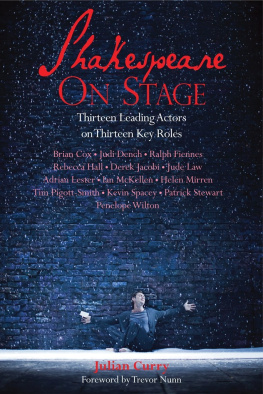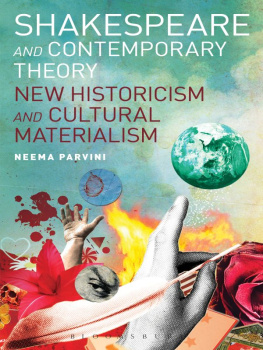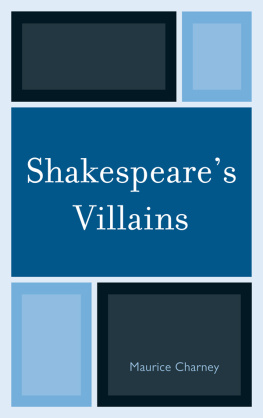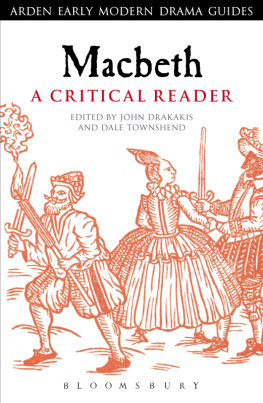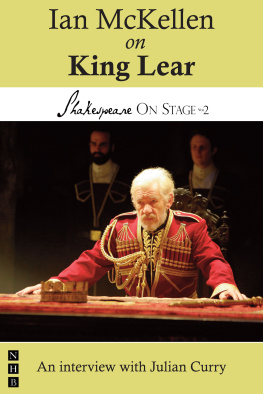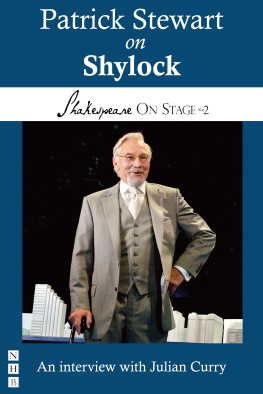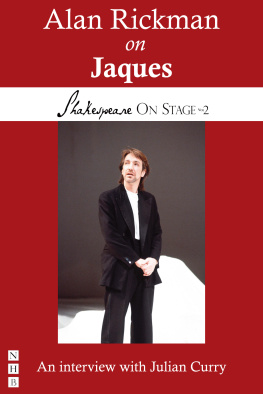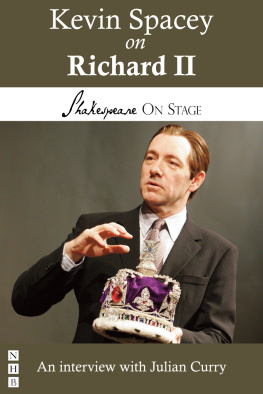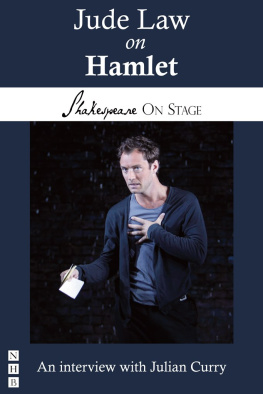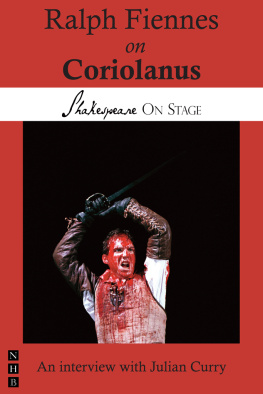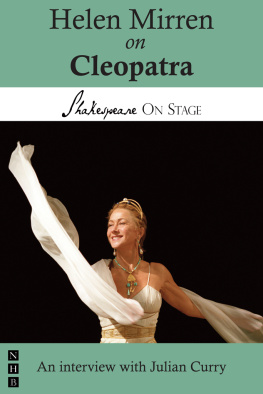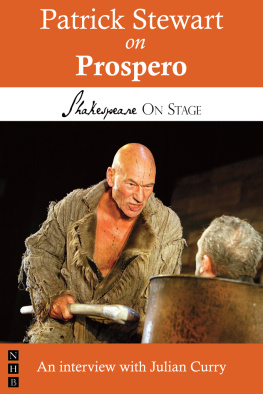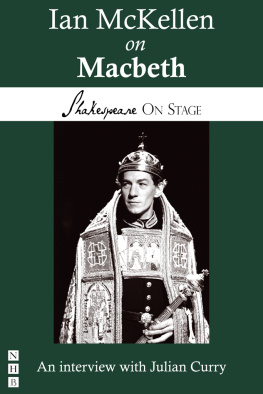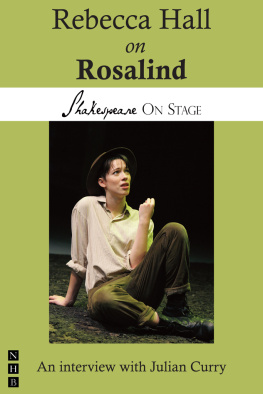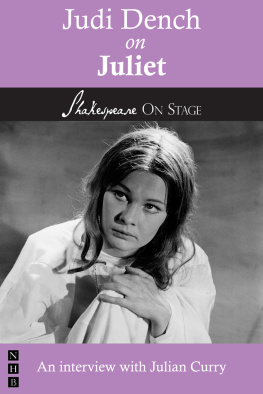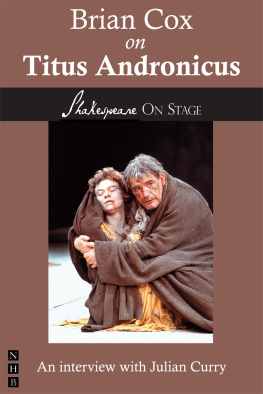Julian Curry
SHAKESPEARE
ON STAGE
Thirteen Leading Actors
on Thirteen Key Roles
Foreword by Trevor Nunn

NICK HERN BOOKS
London
www.nickhernbooks.co.uk
For Mary
Foreword
Trevor Nunn
Sir John Falstaff tells the enthralling story of how he was ambushed by a gang of thieves, and fought with fifty of them. In detail he recounts how he took on two, who as his tale progresses become four, who a moment later become nine and then eleven men, all intent on killing him. But we know that the truth of the matter is quite different. We have seen Falstaff approached by Prince Hal and Poins only, causing the fat knight to run away in terror, offering no resistance. It is a seminal comic scene, because we all of us have heard tall stories, and probably have told tall stories, and we all recognise how stories can be improved with the telling, and the retelling. Anglers vouch that the fish they nearly caught was this big and by the end of the evening in the pub, that fish has grown from a foot long to the size of a shark.
Theatre anecdotes are notoriously and usually hilariously apocryphal. Shakespeare was an actor, so he must have witnessed any number of small mishaps onstage expanding in the telling, or in the tavern, to full-blown disasters of epic proportions. If not, his theatre company was very different from every group I have ever belonged to. Falstaff would seem to prove the point. But if actors are frequently embellishers of the yarn and the anecdote, are they to be believed when they are remembering the influences and the train of events contributing to their performances, particularly their great performances?
I would say the answer is emphatically yes. Hindsight may colour things, sometimes in a rosy hue, but the reminiscences in this book are very much to be believed. Over and over, what the actor is remembering is the feeling of a situation, of a rehearsal, of a role the feeling of creating something; and this record of feeling is more valuable than all of Mr Gradgrinds facts put together.
The actors doing the remembering in this book were all working through a period of enormous and exciting change in approaches to Shakespeare in this country. The age of rhetorical delivery gave way to the discovery, particularly aided by the influence of small-theatre intimate productions, that Shakespeare was at times an astonishingly naturalistic dramatist. In consequence, the voice beautiful and what became disparagingly known as mouth music gave way to the search for and presentation of meaning above all, and in consequence to the ceaseless search for the underlying thought.
It would have been fascinating had a precursor of Julian Curry interviewed a list of successful actors from the early and middle years of the last century, so that we could compare just how differently actors now speak about approaching Shakespeare to how they did back then. The fashion continually changes, and we in the twenty-first century should continue to have a sense of history. In the future, a time will come when the refreshingly personal approaches to playing Shakespeare remembered in this book will seem to be antiquated and, heaven forfend, comic. But at present, these passages of times remembered contribute vividly to the sense of a teemingly creative period when Shakespeare seemed to have been rediscovered.
Introduction
Julian Curry
It tends to be a mugs game, getting actors to talk seriously about their craft. Ralph Richardson used to maintain that acting was the art of stopping people coughing. Michael Gambon describes his work as shouting at night. Anthony Hopkins says all he does is learn the lines and show up. And so on. The more experienced they are, the more reluctant to define and analyse what they do. Marlon Brando said hed rather do anything than discuss acting. And when actors talk about what they do for a living, they all too easily disparage it, reducing it to putting on funny clothes and pretending to be someone else. One day when I grow up, goes the refrain, Ill get a proper job.
This leaves a void which begs to be filled. Paintings are housed in art galleries, books line the shelves of libraries, and music is superbly recorded. But theatre is written on the wind. Even the most brilliant performances exist only in the moment, and will endure nowhere but in the memories of those present. Sure enough a film is sometimes made, in an attempt to preserve a record of a great performance. But it rarely matches the original. A camera cant capture the special aura of a live show. The actor/audience relationship that produces the unique chemistry of theatre will be lacking. Critics write reviews, but as often as not they contradict each other, with diametrically opposed views of the same piece of work. Who is to be believed?
What better, it seemed to me, than that the actors themselves should describe the event? What would I not give for Edmund Keans own account of his King Lear! We have at least this vivid description from his contemporary, Coleridge: To see him act, is like reading Shakespeare by flashes of lightning which simply makes one long to know more, in particular what the man himself might have had to say.
Shakespeares major roles are amongst the most challenging and potentially rewarding for any actor. I decided to see if I could persuade some of those who had played them recently to recollect and describe their performances. I hoped theyd be willing to reveal if not how they acted, at least what they did. I also wanted to know how the show was set, what they wore, and what went on around them. This in itself seemed to have the potential to be a fascinating document.
Who would I approach? The point of departure was a wish list with one very basic criterion: excellent actors who had played leading roles in memorable Shakespearean productions. Having been lifelong in the business, Id worked with many of my intended targets. Some are friends who were easily accessible, and turned out to be most generous with their time. But not everyone was so cooperative. Certain doors remained firmly shut. My attempts to interview Al Pacino about Richard III were thwarted by his agent, a lady so fiercely protective of her clients that she is known in Hollywood as Dr No or The Suppress Agent. Paul Scofield, on the other hand, sent a charmingly self-deprecatory postcard asking to be excused, claiming not to be much good at interviews.
Preparing for the encounters was a labour of love. Of necessity it involved a thorough refresher course, going back to the plays and spending long hours with nose in text. I also read critical studies and pestered archivists for back copies of reviews. I was determined to approach the interviews as well briefed as possible, in order to frame productive questions. And indeed at times it felt like the work of a barrister. The difference is that whereas a barristers questions are designed to steer the witness towards a desired answer, mine were simply intended to get juices flowing and tongues wagging. I concentrated on mechanics rather than theory. As far possible I made the question What did you do? rather than How did you do it?
The conversations were tape-recorded, usually at the actors home or in their current dressing room. I followed, as closely as possible, the following sequence: (1) Put the performance in the context of its time and place, director and designer. (2) General questions about the production and the character. (3) Specific questions about the performance, working through the play from start to finish. (4) Summing up.
Interviews are listed alphabetically by actors name. To try to impose any other arrangement didnt seem helpful. The order does not follow a pattern, and chapters can be read at random.
Next page
